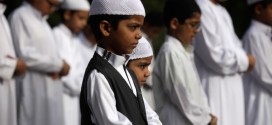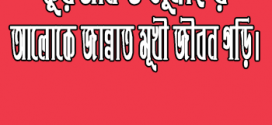The importance of prayer in Islam is great as it is the foremost duty of Muslims and one of the pillars on which the structure of Islam stands. It distinguishes Muslims from non-Muslims. The Holy Prophet, Sall-Allahu alayhi wa sallam, said:
“What stands between a man and disbelief is the abandonment of prayer.”
“Know that among your duties, prayer is foremost.”
The object of prayer is to remember Allah. That is why prayer was dearest to the Prophet, Sall-Allahu alayhi wa sallam, as he said:
“He who gives up prayer has indeed disbelieved.”
It is also important not to pray carelessly as the Quran says:
“Woe to praying ones who are heedless of their prayers.” [Al-Ma’un 107:4-5]
Praying five times a day is compulsory. Prayer consists of recitation of the Holy Quran and glorification of Allah accompanied by various body postures such as standing, bowing, prostrating, and sitting. Through these postures, Muslims express submission, adoration, and humility to Allah. The Prophet Muhammad, Sall-Allahu alayhi wa sallam said:
“You should worship Allah as if you see Him; because though you don’t see Him, He surely sees you.”
Prayer protects one from sins and shameful deeds. Prayer purifies a person and brings him closer to Allah. The Quran says:
“Establish prayer, for prayer restrains from shameful and unjust deeds.” [Al-‘Ankabut 29:45]
The five daily prayers consist of
- Fard: obligatory prayer
- Sunnah: Prophet’s tradition
- Wajib: obligatory prayer (Denying a Fard makes one a non-Muslim but denying a Wajib makes one a sinner. One must make up any missed Fard or Wajib prayers.)
- Nafl: voluntary prayer
The sunnah are again divided into Sunnah Muakkadah and Sunnah Ghair Muakkadah. Sunnah Muakkadah means an act that Prophet Muhammad, Sall-Allahu alayhi wa sallam, always used to do. These rakats must be offered. (However if missed, there is no makeup or qada for it). Sunnah Ghair Muakkadah are sunnahs that Prophet Muhammad, Sall-Allahu alayhi wa sallam, used to leave sometimes without any reason. These are not obligatory.
Fajr:
2 Sunnah Muakkadah
2 Fard
Zuhr:
4 Sunnah Muakkadah
4 Fard
2 Sunnah Muakkadah
2 Nafl
Asr:
4 Sunnah Ghair Muakkadah
4 Fard
Maghrib:
3 Fard
2 Sunnah Muakkadah
2 Nafl
Isha:
4 Sunnah Ghair Muakkadah
4 Fard
2 Sunnah Muakkadah
2 Nafl
3 Witr
2 Nafl
In addition to the above, the terms Fard, Wajib, Sunnah, and Nafl are also applied to conditions or actions within salat. If one misses any Fard part of salat, the salat will be invalid. That omission cannot be compensated by making Sajdah Sahu If a Wajib is missed unintentionally, one can make Sajdah Sahu to make up for it.
Fard Parts before the Salat:
- Body has to be clean of all sorts of impurities.
- Garments should be clean and pure.
- Place of salat should be clean.
- Covering of Satr.
- The right time for salat.
- Facing the Qiblah.
- Having the intention to offer salat.
Fard Parts During the Salat
- To began salat with Takbeer Tahrima.
- Qiyam in every rakah.
- Qirat (in two rakah of Fard, and all rakahs of Sunnah, Wajib, and Nafl)
- Ruku in every rakah.
- Two Sijdahs in every rakah.
- Qa’adah Akhirah
- Salam (To end the salat).
Wajib Parts
- To recite Surah Al- Fatiha in every rakah
- Recite a portion of Quran in the first two rakah of Fard and in every rakah of other salats after Fatiha.
- To observe sequence.
- To observe Qauma.
- To observe Jalsah.
- To observe Qa’ada Ula.
- To recite Tashahud at least once in the two rak’ahs.
- To raise hands with Takbeer for Qunut in the last rakah of Witr.
- To pronounce additional Takbeers in Eid salats.
Sunnah Parts
- To raise hands and turn palms towards Qibla before Takbeer Tahrimah. For males to ear lobes. For female shoulder level.
- To keep the head erect while pronouncing Takbeer Tahrimah.
- To tie hands properly after Takbeer Tahrimah.
- To recite Thana.
- To pronounce Taawwuz.
- To recite Bismillah before Fatiha.
- To recite only Fatiha in 3rd and 4th rakah of Fard.
- To recite Ameen after Fatiha.
- To pronounce tasbih in ruku and sijdah at least thrice.
- To place the knees first, then two hands, then nose and at last forehead in sijdah.
Mustahabb Part
- To look during Qiyaam to the place of sijdah, to look between the two feet during ruku’, at the thighs during Qa’dah, and at the shoulders during Salaam.
Things That Break Salat
- Talking
- Crying (scream)
- To ignore, break, or miss one of the Fard parts (intentionally or unintentionally).
- To deliberately miss any Wajib parts of the salat or unintentionally and failing to perform sijdah-Sahaf.
- To cough or moan unnecessarily.
- To chew or eat something.
- Breaking into laughter.
- To commit a blunder in the recitation of Quran so as to change the meaning.
- To move about or shift unnecessarily.
- To repeat an act irrelevant to the salat over and over again.
- To try to read something in front.
Undesirable Things
- Wearing clothes against the established customs or practices.
- Trying to fold the garments to save them from dust.
- Playing with garments, hair, etc.
- Offering salat in an undignified dress.
- Performing the salat bareheaded.
- Standing up for salat when there is a strong desire to go to the bathroom.
- Placing one’s hands on the hip or back.
- Shaping the fingers or intertwining the fingers of one hand with those of the other.
- Turning the face away from the Qiblah or casting side-glances.
- Yawning on purpose.
- Praying in garments or on mat that has pictures of animals on them or in a place where there are pictures of living beings.
- Standing in the back of Jamaat when there is room in the front.
- Keeping the eyes closed except for concentrating.
- Prostrating one’s self by touching only the forehead or only nose or only edge of the cap.
- Sitting square during the salat without a genuine reason.
- Bending down for ruku before finishing the recitation properly and tying to complete it in the ruku.
- Reciting the Quran regardless of sequence or size in various Rakahs of Fard salat.
- Neglecting a Sunnah part in the salat.
- Raising both feet of the ground in sijdah.
Cases in Which Salat Can Be Broken
- A train, airplane, or ship is going to set off for destination.
- If a snake or harmful creature appears.
- In case of danger of material loss.
- If a person feels a strong desire to go to the bathroom.
- If there is a danger of a blind person falling and drowning in the stream.
- If the clothing catches fire.
- Parents or grandparents call for help in affliction.
Fidyah for one missed salat is the same as that of one missed fast. Therefore, if a person missed all the salats on a day, he will be required to pay fidyah for 6 salats (including the obligatory Witr salat).
 কিতাবুল ইলম কুরআন ও সুন্নাহ'র আলোকে জান্নাত মূখী জীবন গড়ি।
কিতাবুল ইলম কুরআন ও সুন্নাহ'র আলোকে জান্নাত মূখী জীবন গড়ি।





